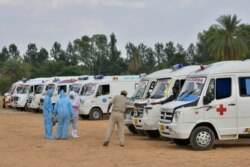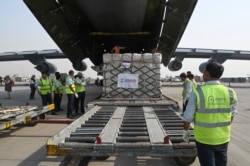A day after declaring the COVID-19 variant first detected in India as one of global concern, the World Health Organization announced Wednesday that the variant has spread to 49 countries.
The U.N. health agency’s new concern about the B.1.617 variant comes as India recorded 4,205 COVID-19 deaths, a new one-day record that pushed the South Asian nation’s overall death toll from the pandemic past the 250,000 mark. India’s total number of confirmed COVID-19 infections is now above 23 million after the Health Ministry reported 348,421 new cases on Wednesday.
A surge of new infections in the world’s second most-populous country has created a humanitarian disaster there, with hospitals filled to capacity and an acute shortage of oxygen to treat the sick, with scores of makeshift crematories rushing to burn the dead. Experts believe the actual casualty figures are much higher than the official figures.
The situation took an unsettling turn this week after more than 100 bodies were found floating in the Ganges River.
Images of bodies floating in the river sparked anger and speculation they died from COVID-19. Authorities have yet to determine the cause of death of the bodies, but some medical experts have voiced concern that the coronavirus can be spread through contaminated water.
The situation in India is one reason the International Federation of the Red Cross says coronavirus cases have “exploded” across Asia in the past two weeks.
The global relief agency said Wednesday the region saw 5.9 million new infections during that period — more than in the Americas, Europe and Africa combined. Seven out of 10 countries that are doubling their infection numbers the fastest are in Asia and the Pacific.
Alexander Matheou, the IFRC’s Asia Pacific director, called for “greater global cooperation” in providing “lifesaving resources, medical equipment, vaccines and money” where they are needed to help people most at risk.
“We’re only safe when everyone is safe,” Matheou said.
Taiwan
Meanwhile, Taiwan health authorities are considering raising its coronavirus alert level after the discovery of 16 new locally transmitted cases.
Taiwan is currently under second of a four-level alert scale, which limits large-scale indoor events to just 100 people and outdoor events to 500 until June 8. A move to Level 3 would create a near-lockdown on the island, with all non-essential businesses forced to close and residents required to wear a face covering.
Health and Welfare Minister Chen Shih-chung told a legislative session Wednesday that the current outbreak was “not a joke.”
President Tsai Ing-wen urged Taiwanese not to panic during a televised address Wednesday, but warned that “the challenge at this moment is still severe.”
Taiwan has been one of the world's biggest success stories in handling the pandemic, recording just 1,210 confirmed COVID-19 infections and just 12 deaths, according to Johns Hopkins Coronavirus Resource Center.
The island imposed strict restrictions on overseas visitors and strict quarantine measures at the start of the outbreak and created a robust contract tracing system. The majority of confirmed coronavirus infections have been limited to new arrivals held in hotel quarantine.









